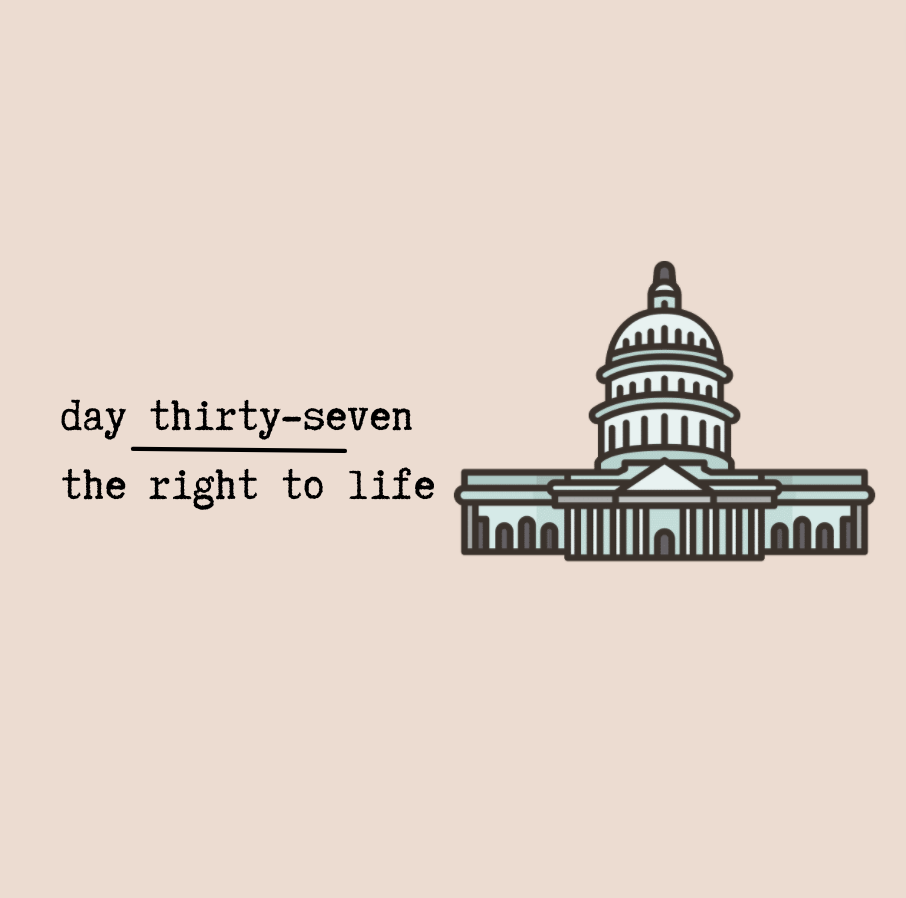Day Thirty-Seven - The Right to Life


Today's Reflection
by Henry Niemeyer
I spent the greater part of yesterday listening to the state legislature’s floor debate on a bill (LB933) that would ban all abortions in the state of Nebraska (provided that the supreme court overturns Roe v. Wade), making it a felony for anyone to perform any procedures or hand out any materials directly intended to “terminate a pregnancy.” Unfortunately (though unsurprisingly) it didn’t pass, but listening to the debate got me thinking. One of the senators explicitly called out the Catholic Church as being the primary driving influence for ill behind the pro-life movement, trying to force their religious beliefs on others. Beyond that, a number of senators said things like “you can philosophize all you want, but…” or “let’s stop with the philosophy and talk about what’s real…” All this made me wonder what might be the best approach to take with this.
Well, the first and most difficult factor is that unless you share your faith with the person with whom you’re conversing, your faith has to stay (at least ostensibly) uninvolved. The second is quite similar in that whatever your personal philosophy may be, regardless of whether it’s divorced from your religion, has no place in such a discussion, as it would be forcing your views and ideals on others.
“But wait! If you can’t argue from religion or philosophy, then what else is there?” Well, there’s always the I-was-a-fetus-once approach, but I’m sure we all know how incredibly effective that is. It occurs to me that since the legality of abortion is primarily a civic issue, the values of the nation itself must be the starting ground, as we can’t argue from seemingly anything else.
Well, how can we use that? And what is the ideology of our nation? Well, though some might say to look to the constitution, I’m not certain that is the best starting point, as it’s primarily a legal document, created to establish and preserve an effective system of government. I would say that the Declaration of Independence, as a philosophical document and the founding premise of our country, should be an apt basis for our working ideological foundation.
The list of “self-evident truths” at the beginning is rather expedient to our purpose. From it, we gather “that all Men are created equal, that they are endowed by their Creator with certain unalienable Rights, that among these are Life, Liberty, and the Pursuit of Happiness—-That to secure these Rights, Governments are instituted among Men.” We can pair this with the rights granted in the constitution to arrive at a more thorough basis for our defense.
Where can we go from here? Well, we’re building a new philosophy from the ground up, so we shouldn’t take anything for granted. The first deduction that comes to mind is that of the hierarchy of rights. All men may be created equal, but all rights certainly are not.
If I were an Aztec and my religion called for human sacrifice, my first amendment right to freedom of religion would be waived for infringing on the victim’s right to life. If I were a drug addict, and my “pursuit of happiness” involved partaking in methamphetamines, my right to the pursuit of happiness in this case would be waived for a combination of reasons including but not limited to the community’s right to relative peace and order and the right to life of those around me, as drugs substantially impair judgment, not to mention the risks of intoxicated driving.
No matter how we build our hierarchy of rights, the right to life must be at the top, as there is nothing more fundamental than our right to simply exist.
That’s it! Case closed, right?
Well, not exactly.
The declaration states that “all Men” are equal and endowed with certain inalienable rights. Again, we’re taking nothing for granted here. We have to delineate the application of this principle.
First point: this isn’t a sexist statement, as the term “men” here is used inclusively to denote the race as a whole (i.e. mankind, or translated to the language of science, Homo Sapiens). Second point: seeing as this principle refers to all of mankind, the question for our issue specifically is whether the unborn are “mankind” or not. I’m certain that most of us know the answer to that, but again, taking nothing for granted, it needs to be restated.
From the moment of conception, an unborn child has DNA that is both human and completely distinct from that of either of his parents. Beyond that, the child meets the scientific criteria for “living,” so from both of these facts, we can deduce that an unborn child is a living member of the species Homo Sapiens, and thus is entitled to our system of rights.
But what’s that? I hear a question from the back of the room. What if the life of the mother is in the balance? A difficult question, to be sure. Rather than simply applying the hierarchy of rights, here the right to life is at stake on both sides. By our standards, an operation can be performed in this case to save the mother’s life, even if the child dies in the process.
“But doesn’t that violate his right to life?”
Well, in one sense yes. However, given that his death is only a byproduct of necessary medical procedures to save the life of the mother, it is necessarily admissible, though deeply tragic. It’s the best outcome you can get from a set of such disastrous circumstances.
All of that forms enough of a working basis for a start. From simply looking at our country’s ideological basis, a little science, and the use of reason, we were able to arrive at our verdict through a nominally secular process. And this is only one of a hundred billion ways to point to the certainty of the truth at hand. If a thing is true, all other truth points towards it. Our role as advocates for such a truth is that of pointing out the vast array of avenues leading to our final truth: the sanctity of human life.
Prayer for Government Leaders
God of power and might, wisdom and justice,
through you authority is rightly administered,
laws are enacted, and judgment is decreed.
Assist with your spirit of counsel and fortitude
the President and other government leaders of these United
States.
May they always seek
the ways of righteousness, justice and mercy.
Grant that they may be enabled by your powerful protection
to lead our country with honesty and integrity.
We ask this through Christ our Lord.
Amen.
Prayer published by Catholic Online.
